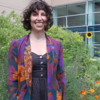How did you become passionate about the topics explored in your research?
When I was in high school, I was really interested in learning Spanish. I took every opportunity I could to advance my knowledge, and in the summer of my sophomore year of high school, I was lucky to participate in a language immersion program in Puerto Rico. The homestay was on the island of Vieques, and the woman that I was staying with was the president of the local chapter of Amnesty International. I learned about the history of U.S. colonialism in Puerto Rico, specifically Vieques, from a firsthand account, and it was a political awakening for me. I saw the worlds I could be entering with the knowledge of another language and the types of impact that I could have. I thought that I would be going into the field of human rights and immigration law, but after taking an art history class, I realized that I could also approach political subjects through my art.
Art was such an important aspect of protests that rose up against these dictatorships. It wasn’t just art on the walls; it was art on the streets, it was artists connecting with each other across different cities, it was using new media to convey their message. I’m just in awe of not only the creativity, but the bravery to make oneself incredibly vulnerable for the sake of their art. I want to use my capacities as a writer and researcher to uplift these people who are also contributing to politics.
Why do you feel that the stories of these repressed artists are important to remember today?
Repressive governments are not reinventing the wheel. There’s so much that can be learned from how artists and political activists created solidarity under the surveillance schemes that were enforced at the time. People always find a way, and even though a repressive government may seem like an omnipotent power, there are always weaknesses. Knowing that people have gone through similar situations is encouraging and inspiring, and these lessons can always be applied to new circumstances. That’s why I think that learning history is important, and art history is another way to access these lessons.
What is the most important piece of advice that you would impart upon a new student pursuing a similar path to yours?
I think my issue is not knowing when to take a break, so I would encourage balance. I think that’s really important because a graduate program can be all-encompassing. It’s hard. You’re working, studying, and trying to be a human at the same time. It’s important to be a human and take time off. I think that can help you get back to work and study effectively.


